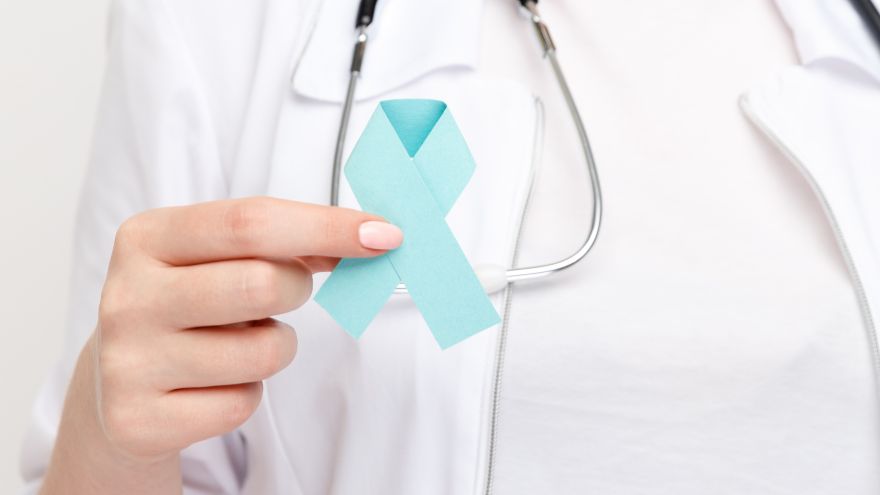Search
-
Perseverance and Physical Therapy Help UNR Student Walk Again
University of Nevada, Reno student Khoa Le was paralyzed in 2010 after a longboarding accident. Through physical therapy, a positive attitude and sheer will, Le is walking again. This weekend, Le will walk across the commencement stage to accept his college diploma. “Walking around on my own power is just the greatest feeling,” says Khoa Le, a senior at the University of Nevada, Reno. Just after finishing summer school at the university in July 2010, his whole life changed within seconds after stepping on a longboard skateboard for the first time. He lost control of the board and hit the curb, causing paralysis on the left side of his body. His journey to recovery began at Renown Health Physical Therapy & Rehab. His physical therapist, Dina Barry, says he never complained once in four years. “I started seeing Khoa in April 2011, and we worked for four years together,” says Barry, a lead physical therapist at Renown. “Everything I’ve ever asked him to do, he does. Le is a hard worker, is continuously optimistic and smiling, and I think that is why he’s accomplished what he has.” Le plans to pursue a career as an information systems manager.
Read More About Perseverance and Physical Therapy Help UNR Student Walk Again
-
Here's How to Commemorate National Healthcare Decision Day
National Healthcare Decision Day is forthcoming. Here’s an easy and free way to commemorate the occasion: openly discussing how we want to be cared for at the end of our lives. Join Renown Health’s experts at a workshop about making decisions about an advance directive. Among the random national holidays, this one has significance: April 16 is National Healthcare Decision Day. And experts agree that the best time to discuss your views about end-of-life care and to learn what choices are available is before a life-limiting illness or crisis occurs. By preparing in advance, you can help reduce the doubt and anxiety related to decision making for your family if you cannot speak for yourself. “Completing your advance directive is a gift you give your family,” says Mary-Ann Brown, RN, MSN, director of Palliative Care. “The stress associated with these difficult decisions is decreased if everyone knows what is important to you and what you want the end of life.” What Are Advance Directives? An advance directive is a document that states your choices about medical treatment and names another person to make medical decisions on your behalf if you are unable to. This document allows you to make legally valid decisions about future medical care. Find more information about advance directives and the form online. The Conversation The first step in completing an Advance Directive is to think about what’s important to you and talk to your loved ones. The Conversation Project provides helpful tools to guide you and your family through this challenging topic. Getting this information together will help you fill out and complete your advance directives. Some things to consider and discuss with your family include: When you think about the last phase of your life, what’s most important to you? Who do you want involved in your care? Who should make decisions on your behalf if you’re not able to? Where do you want or not want to receive care? Are there specific treatments you would or would not want? Complete Your Advance Directive Planning In order to complete an advance directive, you will need either two witnesses or a notary to sign the form. Be sure to note restrictions on the witness process. When an advance directive is complete, you should keep the original. Copies should be given to your agent named in the form, your family, your doctor(s) and the location that you receive care. Renown Health offers four advance directive workshops every month to cover the details of filling out this document. A healthcare team is available to answer questions and work through the process with you. A notary is also present to finalize the process, which means you can complete your advanced directives during this workshop. Find the workshop by calling 775-982-RSVP for more information. Advance Care Planning Workshop April 17, 1-2:30 p.m. | Free Join Renown Health’s experts for a workshop about making decisions regarding end-of-life care. You will learn how to fill out an advance directive, receive one-on-one assistance and have your documents signed by a notary. Workshops are typically held several times each month. To RSVP, call 775-982-7787
Read More About Here's How to Commemorate National Healthcare Decision Day
-
Powerlifting through MS Diagnosis
When Tabitha Cox received a diagnosis of multiple sclerosis (MS), she was in shock, denial and felt that she was too strong for something like this to be happening to her. As the disease progressed, Tabitha realized she needed to do what she could to stay as healthy as possible. “I heard, ‘You have a quarter-size lesion on your brain,'” recalls Tabitha Cox. “At that moment, that was literally all I heard come out of her mouth.” Tabitha’s official diagnosis was multiple sclerosis (MS), an unpredictable, often disabling disease of the central nervous system that slowly debilitated her mom. “I was numb,” says Tabitha. After her diagnosis, Tabitha went on with her life as if the disease was nothing more than a doctor’s diagnosis. However two years later, Tabitha realized something wasn’t right and sought care at Renown Institute for Neurosciences – Brain and Nerve Care. Her form of MS was aggressive, and her doctor recommended treatment right away.
-
Dry Weather and Your Health – What to Know
Dry weather – as northern Nevadans we know it well. Of course this doesn’t mean we’re not affected by its health impact whether you’re new to the area or are a native. Stephanie Stutz, DO, a Renown Medical Group doctor specializing in family medicine, explains how to live comfortably in the high desert. Have you noticed dry skin, itchy eyes or more bloody noses? If you call northern Nevada home, you’re probably no stranger to these problems. “We get a lot of questions from people wanting to know, ‘what can I do to prevent things from happening from the dry weather?’” says Dr. Stutz. “We do have a dry climate, and obviously in the summertime you notice it more than in the winter, so we look at things like dry skin, dry eyes and dry nose.” It generally takes about two weeks to become used to the change in climate. Dry Weather Health Tips Fortunately, there are some easy things you can do to reduce your discomfort in dry weather. Dry skin. “If you have dry skin, use a lotion without perfumes so it won’t increase the potential for drying your skin out,” recommends Dr. Stutz. For example, one home remedy for extremely dry skin (or for those with thinner skin) is cocoa butter. “It’s thicker so it goes under the skin and takes more time to absorb. As a result, you get a much more long-lasting effect.” Dr. Stutz adds. “You can also add lavender essential oil to your cocoa butter to help you sleep at night.” Dry and itchy eyes. “Use eye drops on a regular basis and keep them with you. I recommend people have a couple of bottles – one at home and one in their bag,” Dr. Stutz suggests. Dry nose. “Overall one of the best things to use is a simple nasal wash,” she says. “You can get it over the counter; it’s a saline nasal wash. Use it a couple of times each day and it can be extremely helpful. In particular, gets up into the sinuses and clears them of any pollen or residue in there.” Dry Weather Nosebleed Advice In our dry climate, you may also notice more allergies and nosebleeds. Dr. Stutz cautions, “Surely the dry air can make your allergies much worse. It can create much more irritation, pain and pressure, particularly in the nose and sinuses.” Again, Dr. Stutz recommends using a nasal wash to remove discomfort. Using a nasal wash two to three times a day can also help prevent nosebleeds. “And if you’re someone who has severe or chronic nosebleeds, you can put a little bit of Vaseline along the inside of your nose to create a moisture barrier”. Dry Weather Medication Advice In addition to allergy and nosebleed sufferers, people on certain medications may be at greater risk for symptoms in our dry climate. “The medications you are on can make you much more susceptible to drying out and becoming slightly dehydrated,” Dr. Stutz warns. For this reason discuss all of your medications with your doctor. Specifically, see if you can time them throughout the day or look at changing the dosage. Should I Get a Humidifier? Given our year-round dry weather, you may want to purchase a humidifier to help ease your symptoms. But there are some things you should know first. “You have to be careful with humidifiers as there are pros and cons,” states Dr. Stutz. “The small tabletop humidifiers are not beneficial. You need to get one covering a huge amount of square footage and holding approximately 10 to 30 gallons of water to help your home. On the negative side, if you’re not maintaining it on a regular basis, it will hold on to mold and other allergens. So the next time you turn it on, you’re actually putting that back into the air.” Do I Need to Go to the Doctor? To be sure, it’s important to know yourself and your family. If this is something you experience each year, you can try over-the-counter medications. “But remember, there’s always the caution if you’re on prescription medications,” Dr. Stutz explains. “If you are on chronic prescriptions, come in to get evaluated just to make sure you’re not using anything which interferes with your medications.” Not Just a Summer Problem As the temperatures drop, remember this isn’t just a seasonal issue here in the Reno-Tahoe area. During the winter months, our dry climate combined with cold temperatures and heaters can still cause dry skin, aggravated sinuses and even itchy eyes. So use these helpful dry weather tips all year. Comprehensive Primary Care Renown Medical Group primary care physicians provide comprehensive primary care by appointment. Doctors coordinate each patient’s medical care including checkups, immunizations, referrals to specialists, lab work, X-ray & imaging and hospital admissions. Find a Doctor
-
Low Back Pain – How to Stop the Ache
Low back pain is not only a problem most people have at some point in life, but also the leading cause of disability in the U.S. Whether it is a sharp spasm from lifting something heavy or a daily constant ache, there are various treatments available to relieve your pain. Jessica Ryder PT, DPT, cert VRS, with Renown Health Outpatient Therapy, explains some common causes of this pain, how to treat it and ways to prevent pain flare-ups. It’s important to realize most cases of low back pain are short term. Frequently lasting only a few days or weeks. In general these cases leave no long-term damage to the spine, muscles, discs or nerves. “However, it can become episodic or chronic (lasting longer than 12 weeks) if it is not properly understood or managed by the individual, ” cautions Ryder. Causes of Pain Specifically back discomfort can be related to: Wear and tear on the spine due to age or poor movement patterns Injury to spinal discs Sprains (overstretching or tearing of ligaments) and strains (tears in tendons or muscles) Trauma Irregularities of the spine present at birth (example: scoliosis)Notably the above issues may result in a “pinched nerve” or sciatica, causing pain to extend down the leg. Risk Factors for Pain In particular, your chance of developing low back pain increases with the risk factors below: Age Being overweight Low fitness level or occasional physical activity (“weekend warrior”) Family history Pregnancy Poor posture Jobs requiring heavy physical work (landscaping, plumbers, construction, etc.)
-
What is Disordered Drinking?
An alcohol problem can affect anyone at any age. Many factors, including job stress, genetics or depression, may contribute to the start of disordered drinking. Drinking alcohol exists on a continuum. For example, if someone feels down in the dumps for some time, it doesn’t mean they are clinically depressed. So if someone goes through a period with above-normal alcohol consumption, it doesn’t necessarily mean they abuse alcohol. Although “alcoholic” and “alcoholism” are common, they are not clinical descriptions. Alcohol use disorder is the preferred term. Symptoms are often mild but can be the start of a more significant problem. According to the National Institutes of Health (NIH), over 16 million adults live with alcohol use disorder. Symptoms of Alcohol Use Disorder Do you recognize any of the following symptoms in yourself or someone you know? Drinking more or longer than intended Trying to cut down or stop drinking but not able to Having to drink more than you once did to get the same feeling Being annoyed when family members discuss your drinking Regretting your behavior while you were drinking
-
Learn How to Manage Lymphedema
Katherine Bunker, Physical Therapist and Certified Lymphedema Therapist (PT, DPT, CLT) at Renown, discusses how patients can manage lymphedema with changes to daily routines along with diet and exercise. Lymphedema is a condition that affects millions of people around the world. It is a chronic and progressive disorder that results in swelling of the arms, legs, or other parts of the body due to an accumulation of lymph fluid. Lymphedema can occur because of cancer treatments, surgery, or other medical conditions. Managing Lymphedema Treatments to help reduce symptoms such as pain, swelling and discomfort associated with lymphedema can include compression garments, exercise, skin care, manual lymphatic drainage and pneumatic compression. The goal is to avoid triggering the onset of lymphedema. Lymphedema can present itself immediately after surgery or radiation. It can appear months later or even years later. There are many factors that influence the development of lymphedema which is why prevention is so important. If you have had injury or disruption to your lymphatic system, then: Avoid injuries to the skin near the affected area. For example: wearing gloves during gardening, using bug spray to ward off mosquitos, covering your limbs while playing with pets, keeping nails clean and avoiding cutting too close to cuticle, utilizing electric razors at the armpit (instead of a traditional razor)., Avoid blood pressure readings to the affected limb or request blood pressure to be taken manually, not by a machine. Avoid heat like saunas, hot tubs, sunburns, hot packs, and even massages. Avoid tight jewelry like rings or bracelets, which can be too tight.
-
11 Tips Caregivers Need to Know
Becoming a caregiver or playing a more active role in another’s healthcare is a big responsibility. At some point, almost all adults will support an aging parent or a loved one in need. Keeping track of their needs and wellbeing, while also prioritizing your own can become overwhelming. It’s important to know: you are not alone, and help is available. Read on for 11 tips to help you manage your time, your own wellbeing and your loved one’s care. Self-care comes first. When your main priority is the person in your life who needs care, it’s easy for your own needs to take the backseat. Give yourself time each day to focus on your personal wellbeing. It’s hard to give a loved one the care they need if your own needs are not met. Prioritize the Activities of Daily Living (ADL). Make a note of what ADLs your loved one can do alone, what they need help with and what activities require the most help. This will help you work through the day with them, as well as plan out how the day’s activities will go. Do a home safety audit. Do showers, bathtubs and steps have safety grab bars? Look around the house for additional tripping hazards, like rugs or electrical cords. If your loved one struggles with day-to-day navigation of the home, consider scheduling an occupational therapy appointment. This type of therapy helps a person develop or maintain the motions required to accomplish daily tasks. You might also qualify for a referral to in-home healthcare, such as Home Care. Have the hard conversation. The best time to discuss views about end of life care and to learn what choices are available is before a life-limiting illness or crisis occurs. With advance care planning, you can help reduce the doubt and anxiety related to decision making at the end of life. Completing an Advance Directive is a great tool to sort out all these decisions before they’re needed. Attend a free workshop to learn more and complete this important document. Identify when you need respite. Respite care involves receiving a short-term break from caregiving. Organizing in-home care for your loved one will allow you to step away and tend to your needs. By identifying what kind of respite care you are seeking, you can find the right person to provide you with that much-needed break. Don’t wait until you feel overwhelmed, plan ahead. Write down insurance contact information. Have a direct connection to the right insurance professional for support and advice. If your loved one is eligible Medicare, this is a good opportunity to review their current selections and if they would benefit from a Medicare Advantage Plan or Medicare Supplement Insurance. Seeking out expert advice or information on Medicare options is a great way to navigate this. Consider calling a broker, or attend a free educational seminar with Senior Care Plus. Gather legal and financial information. Make a list of all existing legal documents and financial accounts that your loved one has. These might include a will, advance directive, power of attorney, bank accounts or investment accounts. If you have questions about how to manage them, or need assistance in setting up additional framework, reach out to a lawyer, legal service, financial adviser or bank representative. Create an inventory of medical information. Identify where all of your loved one’s medical records are, as well as a list of providers or healthcare practices where they have received care. Consider if you should have your loved one give you Proxy Access in MyChart, which allows you to access all the features in MyChart on their behalf, including viewing upcoming appointments, viewing test results and emailing a doctor on their behalf. Make a list of what others can do. Think about all the little (and big) things that need to happen, and write down tasks that others could take care of you. When someone says “let me know what I can do” you’ll be ready with a pre-written list of items they may be able to assist with. Tasks could include tackling around-the-house repairs, scheduling lawn work, helping to walk the dog, taking a car for an oil change and cleaning. Find programs and events for social enjoyment. If and when possible, seek an activity outside of the home. Look for community centers that have programs for seniors, recreational activities or meals that you can patriciate in together. If leaving the home is not an option, arrange for visits or in-home activities, such as movie nights, card games or time to visit with family. Research long-term options. If you will be considering a nursing home or assisted living, make a list of amenities that you and the person you are caring for would like. Take this list with you when visiting potential locations to make sure you don’t forget to ask about each item.
-
Why are Annual Exams & Routine Screenings Important?
March is Colorectal Cancer Awareness Month, and we want you to receive the best preventative care possible. Early detection can help prevent serious illness, yet many people still choose to skip their annual exams and routine screenings. Bonnie Ferrara, MD, MPH, Section Chief for Primary Care at Renown Medical Group, further explains the importance of this simple, easy way to stay healthy. Why are annual exams so important? The benefits of early detection and prevention to save lives and reduce the impacts of disease have been proven. These exams are the perfect opportunity to get your health questions answered. “This is your chance to sit down with your provider and talk about your overall health and your family’s health history as well as your concerns for the future,” says Bonnie Ferrara, M.D., family medicine. “It’s the opportunity for your provider to talk with you about your lifestyle, tobacco use, exercise and alcohol use, all of which make a difference in your future longevity.” The annual wellness exam is also an ideal time for most adult patients to discuss health screenings. In addition, these visits are the perfect time to address issues that may not directly relate to a particular medical problem or immediate illness. A good rule of thumb is to schedule these appointments around your birthday each year to make sure you and your provider are both updated on your care. Why would you need an annual exam if you aren’t feeling sick? According to Dr. Ferrara, seeing your care provider when you aren’t sick is one of the best times. “It is better if you try to arrange this visit when you are not feeling ill,” she says. “It is an opportunity to talk about wellness. Not only how to contribute to your wellness but also the changes that you can make that will make huge dividends in the future for your wellness. In addition, it allows us to do some education about what to expect in the coming years as far as your health and lifestyle changes.” What can you expect at an annual exam? Annual exams usually check your: History – lifestyle behaviors, health concerns, vaccination status, family medical history Vitals – blood pressure, heart rate, respiration rate and temperature General appearance – your care provider can find out a lot about you just by watching and talking to you Dr. Ferrara adds, “If this is a Medicare annual wellness exam, it is an opportunity to talk to your provider about depression and dementia as well as be tested for those.” You can also leverage your annual exam to speak to your provider about managing your chronic health problems. "As a provider, these visits give us the opportunity to hear how the medications and lifestyle changes we have recommended are working and if you are having problems with these, we have the opportunity to make suggestions of how to do things better for the future," Dr. Ferrara.
Read More About Why are Annual Exams & Routine Screenings Important?
-
Helpful Caregivers Make a Wedding Dream Come True
A wedding is a big day for the wedding couple, but it’s also special for loved ones. A patient at Renown, Ken, got to take part in his daughter’s special day as her wedding plans changed to accommodate his medical condition. Grab some tissues and read how Renown’s team of compassionate caregivers and chaplains planned a wedding in Fianna’s Healing Garden. Ken was hospitalized at Renown Regional Medical Center where he was battling a lung problem – which was unrelated to COVID-19 – and his condition worsened rapidly on Wednesday, Aug. 12. His family made the decision to transition him to palliative care, which helps patients near the end of their lives remain comfortable, while supporting their dignity and quality of life. Ken’s medical condition altered wedding plans for his daughter, Chandra, and her fiancé, Tyler, who were planning to tie the knot later in 2020. Chandra wanted her father there, but knew he could not leave the hospital. That’s why Chandra’s sister, Heather, approached Ken’s care team with a request to have a small wedding ceremony at the hospital. Planning the Wedding A member of Ken’s care team, Amy Heston, registered nurse (RN), began planning how the wedding could be held outdoors in Fianna's Healing Garden in the E. L. Wiegand Pavilion, which was donated by the E. L. Wiegand Foundation. In 24 hours, Amy planned a wedding ceremony with the help of her colleague, Breyanna Aufiero, RN; the Renown Spiritual Care team; and nursing leaders on the coronary intensive care unit (ICU). Together, they decorated the aisle in the garden with flowers and battery-operated candles. They also made a sign for Ken’s hospital bed, which read, “Father of the Bride,” and crafted a bow tie for him to wear for the special occasion. With visitor restrictions in place at the hospital due to coronavirus (COVID-19), having the wedding outside in the Healing Garden allowed for more members of Ken’s family to attend including his wife, Charlotte, and his dog, Bella. Every step in planning the wedding required thoughtful and thorough care coordination so Ken could participate. His breathing was supported by oxygen and special arrangements were made to transport the oxygen tanks he needed to take part in his daughter’s wedding. Amy worked with respiratory technician, Kasey Benfield, and critical care technician, Ruben Duckworth, to ensure Ken’s oxygen needs were met using portable machines. Celebrating Love and Life Together Ken’s team of caregivers bathed him and shaved his face so he could look and feel his best for the ceremony. They put on his bow tie, covered his bed in decorations and his favorite blue, flannel blanket, and wheeled his bed outside for the ceremony. Renown associate chaplains Terri Domitrovich and Susan Palwick coordinated music and performed the ceremony for Chandra and Tyler on Thursday, Aug. 13, 2020. The bride and groom shared their first dance in the garden and Ken’s care team provided water and treats to give the family a full wedding experience. Shortly after the ceremony, Ken passed away. This wedding provided Ken and his family meaningful memories for their big life-changing moments as they celebrated and said goodbye. “Seeing Ken surrounded by family he never would have gotten to see again while in the hospital, watching him get to share a father-daughter dance with Chandra on her wedding day, and having him tell me that this day meant more to them than we would ever know were some of the most moving moments I’ve witnessed as a nurse,” Amy said. “I am so thankful for the team we have here. I know that this beautiful day wouldn’t have happened without the help of every single person who gave their time, money, creativity and passion to make it a day to remember.”
Read More About Helpful Caregivers Make a Wedding Dream Come True
-
Renown Neuro Diagnostic Laboratory Nationally Recognized
Earning its third five-year accreditation, Renown’s neuro-diagnostic lab remains Nevada’s only accredited ABRET facility. The Renown Institute for Neurosciences is pleased to announce that the neuro-diagnostic lab at Renown Regional Medical Center has been re-accredited by the American Board of Registration of Electroencephalographic and Evoked Potential Technologists (ABRET). ABRET’s lab accreditation process evaluates technical standards, the quality of a laboratory’s output, and lab management. “Renown Health is a leader and a destination for health in treating neurological disorders and advancing innovations in neurology. The specialists at the Renown Institute for Neurosciences provide comprehensive brain, nerve and surgical support along with a full range of diagnostic and additional procedures and a disease-specific, patient-focused approach to care,” says Tony Slonim, MD, DrPH, FACHE, President and CEO, Renown Health. “This prestigious honor from ABRET means Renown’s Electroencephalogram (EEG) Laboratory has met strict standards and is recognized as a place where patients and physicians can confidently receive quality diagnostics.” “In addition to re-accreditation from ABRET, the Institute for Neurosciences has earned a Gold Seal of Approval by the Joint Commission and offers advanced treatment options including t-PA (Tissue Plasminogen Activator) and biplane angiography. The Level III accredited Epilepsy laboratory implements some of the newest treatments available,” said Renown’s Chief Medical Officer, Paul Sierzenski, MD, MSHQS, CPE, FACEP. “Renown patients also have access to the most promising new therapies through national clinical trials, which have been shown to significantly improve patients’ health and well-being.” “I am proud to recognize our dedicated team of caregivers for their continued passion and excellence in maintaining the highest standards in patient care,” said Renown Institute for Neurosciences’ Division Chief, Dr. Rolando Ania. “It is all thanks to their tremendous efforts that we remain the only ABRET accredited laboratory, as well as the only nationally accredited epilepsy center (NAEC Level III), in the state of Nevada.” Using a collaborative approach, specialists at the Renown Institute for Neurosciences use leading-edge diagnostic tools to identify neurological conditions and treat patients with the most effective techniques available. What is a Neuro-diagnostic Lab? A neuro-diagnostic lab allows care teams the technology to evaluate how a patient’s peripheral, autonomic, and central nervous systems function, and aid in diagnosing and treating conditions such as epilepsy, multiple sclerosis, Parkinson’s disease, stroke, and other diseases of the nervous system. What is an Electroencephalogram (EEG)? An Electroencephalogram (EEG) is a test that measures and records the electrical activity of the brain. During the test, special sensors called electrodes are attached to the patient’s head and hooked by wires to a computer. The computer then records the brain’s electrical activity on the screen. Using a collaborative approach, specialists at the Renown Institute for Neurosciences use leading-edge diagnostic tools to identify neurological conditions and treat patients with the most effective techniques available. Renown Health hospitals are ranked as Nevada’s top hospitals by U.S. News & World Report.
Read More About Renown Neuro Diagnostic Laboratory Nationally Recognized
-
Keeping Your Brain Healthy, No Matter Your Age
It’s true there is no cure for dementia, yet studies suggest your life choices today can reduce brain decline in the future. How important is diet to brain health? Food is the foundation of your body. Fats, carbs and protein provide the energy for your cells and metabolism. So the quality and amount of food you eat directly affects your brain. Specifically, researchers are paying special attention to the link a high sugar diet and/ or an unhealthy fat diet may have on your brain. Your brain on sugar According to the Alzheimer’s Association, when too much sugar is in the bloodstream for long periods of time, it can damage the brain cells. Many people with diabetes may develop brain abnormalities, and these changes may increase chances of dementia — research is still being done to understand this connection. Many U.S. adults have prediabetes with blood sugar higher than normal. Insulin resistance often leads to diabetes. Insulin resistance has been linked to metabolic syndrome, which is a precursor for cardiovascular and cerebrovascular disease (heart attack, stroke). Some signs of metabolic syndrome include: Large waist size (40 inches or more for men, 35 inches and up for women) Low HDL (good) cholesterol level Higher than normal blood pressure — 130/85 and above Current research suggests too much sugar in the blood causes inflammation, which can damage brain cells. High carbohydrate foods, such as sweetened beverages, chips, white rice, white potatoes, bagels, cereals and desserts, have been shown to raise blood sugar. Although anyone can get diabetes, Hispanic Americans and African Americans are at greater risk.
Read More About Keeping Your Brain Healthy, No Matter Your Age











